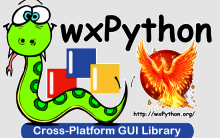 wx.py.interpreter.Interpreter¶
wx.py.interpreter.Interpreter¶
Interpreter based on code.InteractiveInterpreter.
 Class Hierarchy¶
Class Hierarchy¶

 Known Subclasses¶
Known Subclasses¶
wx.py.interpreter.InterpreterAlaCarte
 Known Superclasses¶
Known Superclasses¶
 Methods Summary¶
Methods Summary¶
Create an interactive interpreter object. |
|
Return list of auto-completion keycodes. |
|
Return list of auto-completion options for a command. |
|
Return call tip text for a command. |
|
Send command to the interpreter to be executed. |
|
Compile and run an ast module in the interpreter. |
|
Compile and run source code in the interpreter. |
 Class API¶
Class API¶
- class Interpreter(InteractiveInterpreter)¶
Interpreter based on code.InteractiveInterpreter.
Methods¶
- __init__(self, locals=None, rawin=None, stdin=sys.stdin, stdout=sys.stdout, stderr=sys.stderr, showInterpIntro=True)¶
Create an interactive interpreter object.
- getAutoCompleteKeys(self)¶
Return list of auto-completion keycodes.
- getAutoCompleteList(self, command='', \*args, \*\*kwds)¶
Return list of auto-completion options for a command.
The list of options will be based on the locals namespace.
- getCallTip(self, command='', \*args, \*\*kwds)¶
Return call tip text for a command.
Call tip information will be based on the locals namespace.
- push(self, command, astMod=None)¶
Send command to the interpreter to be executed.
Because this may be called recursively, we append a new list onto the commandBuffer list and then append commands into that. If the passed in command is part of a multi-line command we keep appending the pieces to the last list in commandBuffer until we have a complete command. If not, we delete that last list.
- runModule(self, mod)¶
Compile and run an ast module in the interpreter.
- runsource(self, source)¶
Compile and run source code in the interpreter.

